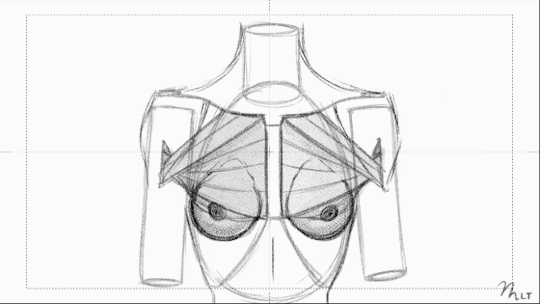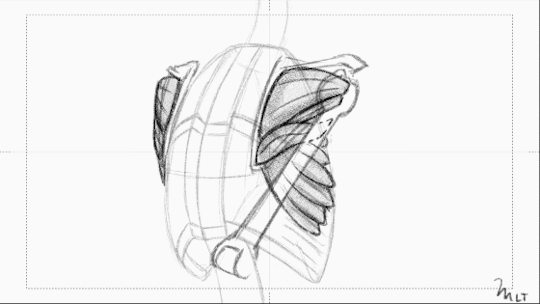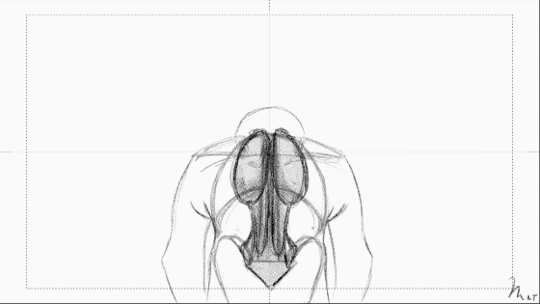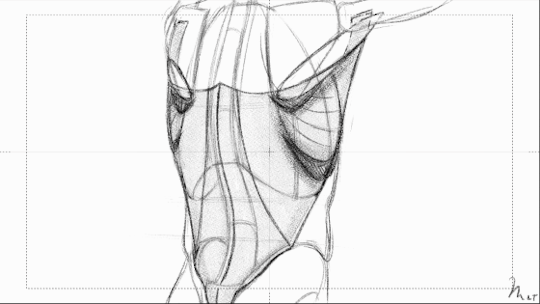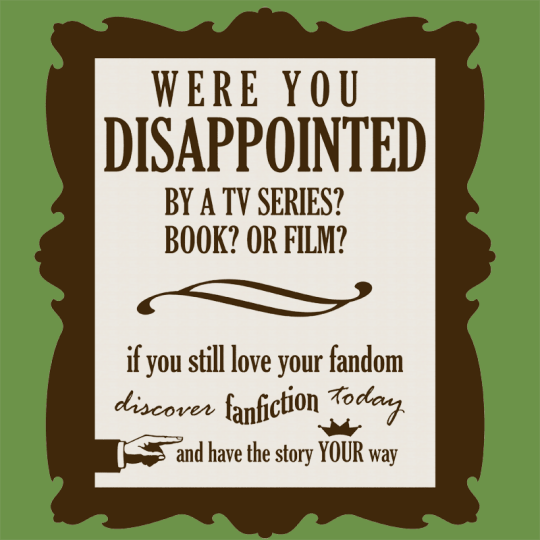18+ only! This is where the mun post mun stuff and things I find interesting from here on out. Going to say it now, I'm not going to sensor myself. So this will be super NSFW.
Don't wanna be here? Send us removal request.
Text
WEIRDLY SPECIFIC BUT HELPFUL CHARACTER BUILDING QUESTIONS
What’s the lie your character says most often?
How loosely or strictly do they use the word ‘friend’?
How often do they show their genuine emotions to others versus just the audience knowing?
What’s a hobby they used to have that they miss?
Can they cry on command? If so, what do they think about to make it happen?
What’s their favorite [insert anything] that they’ve never recommended to anyone before?
What would you (mun) yell in the middle of a crowd to find them? What would their best friend and/or romantic partner yell?
How loose is their use of the phrase ‘I love you’?
Do they give tough love or gentle love most often? Which do they prefer to receive?
What fact do they excitedly tell everyone about at every opportunity?
If someone was impersonating them, what would friends / family ask or do to tell the difference?
What’s something that makes them laugh every single time? Be specific!
When do they fake a smile? How often?
How do they put out a candle?
What’s the most obvious difference between their behavior at home, at work, at school, with friends, and when they’re alone?
What kinds of people do they have arguments with in their head?
What do they notice first in the mirror versus what most people first notice looking at them?
Who do they love truly, 100% unconditionally (if anyone)?
What would they do if stuck in a room with the person they’ve been avoiding?
Who do they like as a person but hate their work? Vice versa, whose work do they like but don’t like the person?
What common etiquette do they disagree with? Do they still follow it?
What simple activity that most people do / can do scares your character?
What do they feel guilty for that the other person(s) doesn’t / don’t even remember?
Did they take a cookie from the cookie jar? What kind of cookie was it?
What subject / topic do they know a lot about that’s completely useless to the direct plot?
How would they respond to being fired by a good boss?
What’s the worst gift they ever received? How did they respond?
What do they tell people they want? What do they actually want?
How do they respond when someone doesn’t believe them?
When they make a mistake and feel bad, does the guilt differ when it’s personal versus when it’s professional?
When do they feel the most guilt? How do they respond to it?
If they committed one petty crime / misdemeanor, what would it be? Why?
How do they greet someone they dislike / hate?
How do they greet someone they like / love?
What is the smallest, morally questionable choice they’ve made?
Who do they keep in their life for professional gain? Is it for malicious intent?
What’s a secret they haven’t told serious romantic partners and don’t plan to tell?
What hobby are they good at in private, but bad at in front of others? Why?
Would they rather be invited to an event to feel included or be excluded from an event if they were not genuinely wanted there?
How do they respond to a loose handshake? What goes through their head?
What phrases, pronunciations, or mannerisms did they pick up from someone / somewhere else?
If invited to a TED Talk, what topic would they present on? What would the title of their presentation be?
What do they commonly misinterpret because of their own upbringing / environment / biases? How do they respond when realizing the misunderstanding?
What language would be easiest for them to learn? Why?
What’s something unimportant / frivolous that they hate passionately?
Are they a listener or a talker? If they’re a listener, what makes them talk? If they’re a talker, what makes them listen?
Who have they forgotten about that remembers them very well?
Who would they say ‘yes’ to if invited to do something they abhorred / strongly didn’t want to do?
Would they eat something they find gross to be polite?
What belief / moral / personality trait do they stand by that you (mun) personally don’t agree with?
What’s a phrase they say a lot?
Do they act on their immediate emotions, or do they wait for the facts before acting?
Who would / do they believe without question?
What’s their instinct in a fight / flight / freeze / fawn situation?
What’s something they’re expected to enjoy based on their hobbies / profession that they actually dislike / hate?
If they’re scared, who do they want comfort from? Does this answer change depending on the type of fear?
What’s a simple daily activity / motion that they mess up often?
How many hobbies have they attempted to have over their lifetime? Is there a common theme?
68K notes
·
View notes
Text
A general cane guide for writers and artists (from a cane user, writer, and artist!)
Disclaimer: Though I have been using a cane for 6 years, I am not a doctor, nor am I by any means an expert. This guide is true to my experience, but there are as many ways to use a cane as there are cane users!
This guide will not include: White canes for blindness, crutches, walkers, or wheelchairs as I have no personal experience with these.
This is meant to be a general guide to get you started and avoid some common mishaps/misconceptions in your writing, but you absolutely should continue to do your own research outside of this guide!
This is NOT a medical resource!!! And never tell a real person you think they're using a cane wrong!
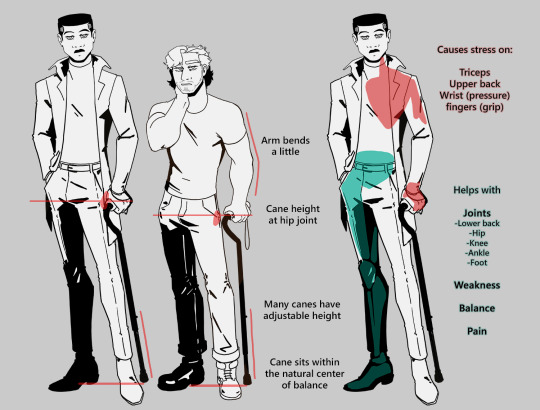
The biggest recurring problem I've seen is using the cane on the wrong side. The cane goes on the opposite side of the pain! If your character has even-sided pain or needs it for balance/weakness, then use the cane in the non-dominant hand to keep the dominant hand free. Some cane users also switch sides to give their arm a rest!
A cane takes about 20% of your weight off the opposite leg. It should fit within your natural gait and become something of an extension of your body. If you need more weight off than 20%, then crutches, a walker, or a wheelchair is needed.
Putting more pressure on the cane, using it on the wrong side, or having it at the wrong height can make it less effective, and can cause long term damage to your body from improper pressure and posture. (Hugh Laurie genuinely hurt his body from years of using a cane wrong on House!)
(some people elect to use a cane wrong for their personal situation despite this, everyone is different!)
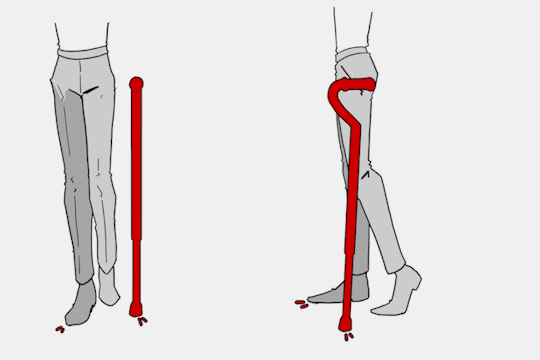
(an animated GIF of a cane matching the natural walking gait. It turns red when pressure is placed on it.)
When going up and down stairs, there is an ideal standard: You want to use the handrail and the cane at the same time, or prioritize the handrail if it's only on one side. When going up stairs you lead with your good leg and follow with the cane and hurt leg together. When going down stairs you lead with the cane and the bad leg and follow with the good leg!
Realistically though, many people don't move out of the way for cane users to access the railing, many stairs don't have railings, and many are wet, rusty, or generally not ideal to grip.
In these cases, if you have a friend nearby, holding on to them is a good idea. Or, take it one step at a time carefully if you're alone.
Now we come to a very common mistake I see... Using fashion canes for medical use!
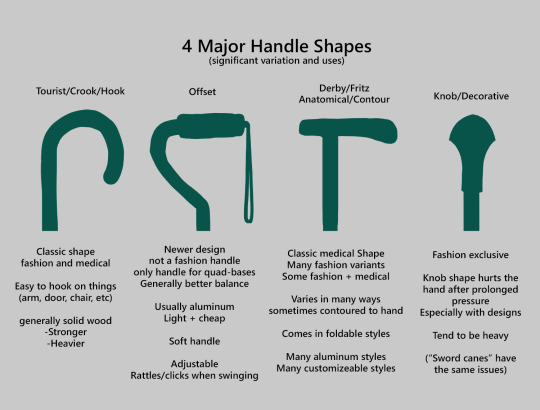
(These are 4 broad shapes, but there is INCREDIBLE variation in cane handles. Research heavily what will be best for your character's specific needs!)
The handle is the contact point for all the weight you're putting on your cane, and that pressure is being put onto your hand, wrist, and shoulder. So the shape is very important for long term use!
Knob handles (and very decorative handles) are not used for medical use for this reason. It adds extra stress to the body and can damage your hand to put constant pressure onto these painful shapes.
The weight of a cane is also incredibly important, as a heavier cane will cause wear on your body much faster. When you're using it all day, it gets heavy fast! If your character struggles with weakness, then they won't want a heavy cane if they can help it!
This is also part of why sword canes aren't usually very viable for medical use (along with them usually being knob handles) is that swords are extra weight!
However, a small knife or perhaps a retractable blade hidden within the base might be viable even for weak characters.
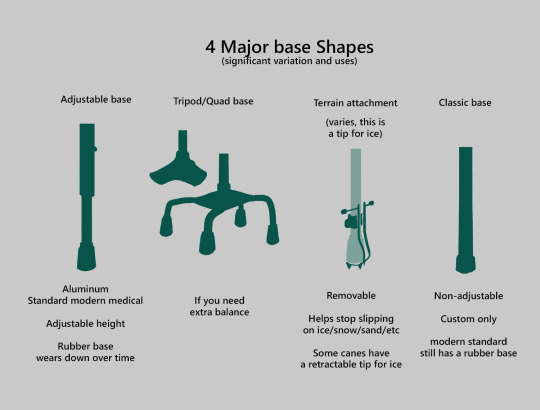
Bases have a lot of variability as well, and the modern standard is generally adjustable bases. Adjustable canes are very handy if your character regularly changes shoe height, for instance (gotta keep the height at your hip!)
Canes help on most terrain with their standard base and structure. But for some terrain, you might want a different base, or to forego the cane entirely! This article covers it pretty well.
Many cane users decorate their canes! Stickers are incredibly common, and painting canes is relatively common as well! You'll also see people replacing the standard wrist strap with a personalized one, or even adding a small charm to the ring the strap connects to. (nothing too large, or it gets annoying as the cane is swinging around everywhere)
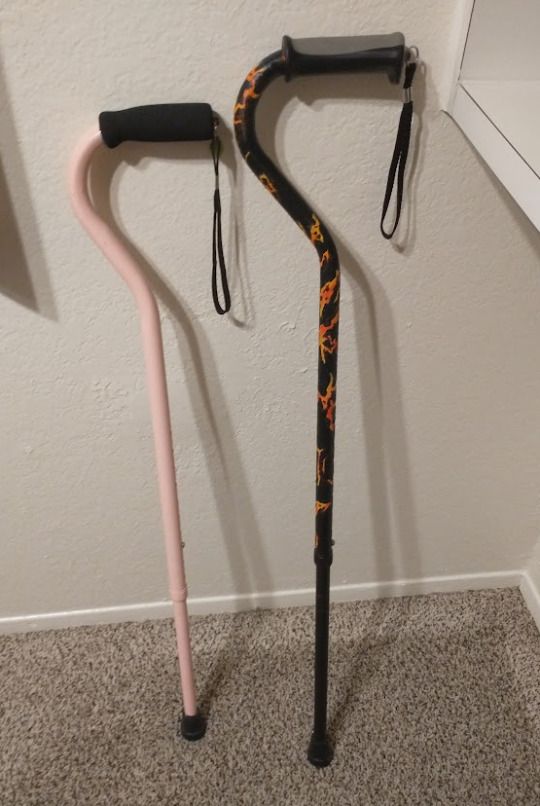
(my canes, for reference)
If your character uses a cane full time, then they might also have multiple canes that look different aesthetically to match their outfits!
When it comes to practical things outside of the cane, you reasonably only have one hand available while it's being used. Many people will hook their cane onto their arm or let it dangle on the strap (if they have one) while using their cane arm, but it's often significantly less convenient than 2 hands. But, if you need 2 hands, then it's either setting the cane down or letting it hang!
For this reason, optimizing one handed use is ideal! Keeping bags/items on the side of your free hand helps keep your items accessible.
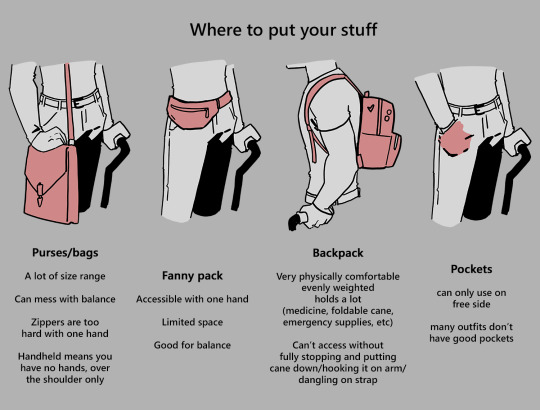
When sitting, the cane either leans against a wall or table, goes under the chair, or hooks onto the back of the chair. (It often falls when hanging off of a chair, in my experience)
When getting up, the user will either use their cane to help them balance/support as they stand, or get up and then grab their cane. This depends on what it's being used for (balance vs pain when walking, for instance!)
That's everything I can think of for now. Thank you for reading my long-but-absolutely-not-comprehensive list of things to keep in mind when writing or drawing a cane user!
Happy disability pride month! Go forth and make more characters use canes!!!
93K notes
·
View notes
Text

watching gen z and millennials make fun of gen alpha has been torturous. "But they're actually stupid" 1. theyre middle schoolers 2. isn't that what older gens said about us? don't you remember being 11?
it truly is just "impulse reaction to cringe <- has not yet unlearned shame"
the cycle continues let me out of here
guys. guys I think we should kill cringe culture
118K notes
·
View notes
Note
so I saw that you work with Krita when it comes to your art. Do you have any tips when it comes the app? I have just started using it.
Sure!
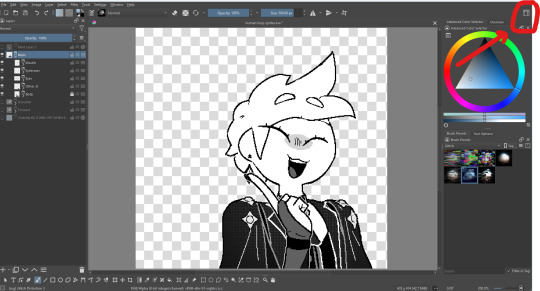
Up here is your workspaces tab where you can switch between different layouts. You can also adjust, make, and save your own layouts until you find the perfect orientation that you're most comfortable with.

If you go to Settings -> Dockers, you can see all the different widgets (?) that you can add to your layout.


You can right click on brushes to add/remove them from tags to help you organize.
Here's a resource for adding and finding new brushes
If you want to use Krita to animate, I would recommend reading this beforehand because Krita is still working on implementing rendering and you need to download an extension to do that.
Since I don't know your familiarity with digital drawing programs in general I don't know what to explain, a lot of the things in Krita can be traced back and forth with other drawing programs, things are just in different places which poking around the program can help you find
if anyone has any other tips please feel free to add!
42 notes
·
View notes
Text
youtube

Rathalaugust 2023 (catchup) day 29: Brachydios
I couldn't get this image out of my head, so have some silly hunter-bullying.
537 notes
·
View notes
Photo
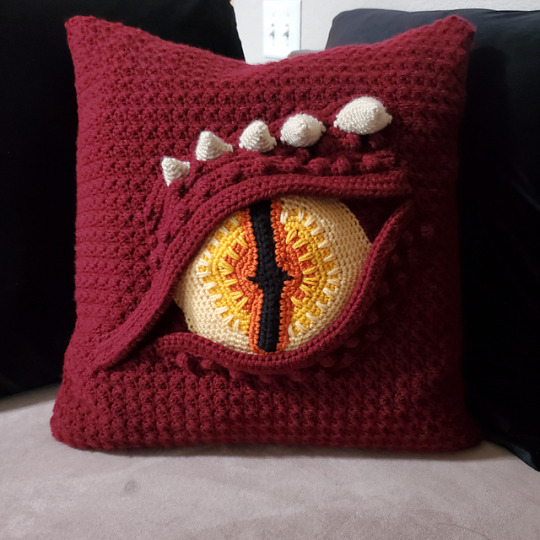
Dragon Eye Pillow by Hooked by Kati
Free Crochet Pattern Here
585 notes
·
View notes
Photo

Dragon Eye Pillow by Hooked by Kati
Free Crochet Pattern Here
585 notes
·
View notes
Text
If you're ever bored, here's a list of Studio Ghibli films you can watch for free.
Castle In The Sky (1986) Grave of the Fireflies (1988) My Neighbor Totoro (1988) Kiki’s Delivery Service (1989) Only Yesterday (1991) Porco Rosso (1992) Pom Poko (1994) Whisper of the Heart (1995) Princess Mononoke (1997) My Neighbors the Yamadas (1999) Spirited Away (2001) The Cat Returns (2002) Howl’s Moving Castle (2004) Tales from Earthsea (2006) Ponyo On A Cliff From The Sea (2008) The Secret World of Arrietty/The Borrower Arrietty (2010) From Up on Poppy Hill (2011)
If any of the links stop working, please let me know so I can fix it.
For Castle In The Sky, wait for the free user button to be clickable and it will send you to the video.
429K notes
·
View notes
Text
things I wish I’d known when I started writing fic on ao3
use & for friendships, colleagues, familial relationships and use / for romantic or sexual relationships (or encounters)
not everyone reads fic. Lots of people use screen readers, and screen readers can’t see what’s on images. use descriptive text to help them out.
lots of people download fic to read on other devices, not all downloads capture images too.
there’s a big difference between No Archive Warnings Apply (NAWA) and Author Chose Not to Use Archive Warnings (CNTW). NAWA means that there’s nothing in the fic that needs to be warned for using the official Archive Warning system. CNTW means there might be something that requires a warning and the author is either avoiding giving out spoilers or they are unsure how to interpret their plot point with respect to the official Warnings. (in both cases, additional tags are where it’s at - you can explain yourself there)
the reason why the number of bookmarks in the fic is different from the number of bookmarks on your stats page is because your stats page number includes bookmarks that are hidden
there’s a preference setting where you can receive emails with your own comments/replies.
there’s a site skin that hides stats so you don’t have to see them
writing in rich text format makes my life easier
knowing html allows me to do fun things in the comments section like comment/reply with reaction gifs
knowing html also allows me to do interesting formatting in my fics that I can’t do with rich text alone
those little blue bubbles with the question marks in them will answer my questions a lot of the time - and also teach me something new
the FAQ is linked under the word About in the header
if you write your fic in the draft window, you might end up losing it so make sure you copy the text before you hit Post, just in case
they aren’t kidding when they say drafts are deleted after 30 days
39K notes
·
View notes
Text
Writing fight scenes
masterlist. main navigation.
@bluebxlle_writer on Instagram
1. Pacing
A fight scene should be fast-paced and intense. Unless it's a final battle with numerous parties, a fight scene that's too long tends to take away suspense. To speed up your pacing, use active voice to describe movement and don't overdescribe your characters' thoughts. Excessive inner monologue will be unrealistic, as people usually have no room to think during intense combats.
2. Character mannerisms
Here's a point that people often overlook, but is actually super important. Through fight scenes, you should be able to reveal your characters' contrasting mannerisms and personality. A cunning character would play dirty - fighting less and making use of their opponent's weakness more. A violent character would aim to kill. A softer one would only target to disarm their enemies, using weakened attacks. A short-minded character would only rely on force and attack without thinking. This will help readers understand your characters more and decide who to root for.
3. Making use of surroundings
Not only the characters, you also need to consider the setting of your fight scene and use it to your advantage. Is it suitable for fighting, or are there dangerous slopes that make it risky? Are there scattered items that can help your characters fight (e.g. nails, shards of glass, ropes, wooden boards, or cutlery)? Is it a public place where people can easily spot the fight and call the authorities, or is it a private spot where they can fight to the death?
4. Description
The main things that you need to describe in a fight scene are :
• Characters involved in the fight
• How they initiate and dodge attacks
• Fighting styles and any weapons used
• The injuries caused
Be careful to not drag out the description for too long, because it slows down the pace.
5. Raise the stakes
By raising the stakes of the fight, your readers will be more invested in it. Just when they think it's over, introduce another worse conflict that will keep the scene going. Think of your characters' goals and motivations as well. Maybe if the MC didn't win, the world would end! Or maybe, one person in the fight is going all-out, while the other is going easy because they used to be close :"D
6. Injuries
Fights are bound to be dirty and resulting in injuries, so don't let your character walk away unscathed - show the effect of their injuries. For example, someone who had been punched in the jaw has a good chance of passing out, and someone who had been stabbed won't just remove the knife and walk away without any problem. To portray realistic injuries, research well.
7. Drive the plot forward
You don't write fight scenes only to make your characters look cool - every fight needs to have a purpose and drive the plot forward. Maybe they have to fight to improve their fighting skills or escape from somewhere alive. Maybe they need to defeat the enemy in order to obtain an object or retrieve someone who had been kidnapped. The point is, every single fight scene should bring the characters one step closer (or further :D) to the climax.
8. Words to use
• Hand to hand combat :
Crush, smash, lunge, beat, punch, leap, slap, scratch, batter, pummel, whack, slam, dodge, clobber, box, shove, bruise, knock, flick, push, choke, charge, impact
• With weapon :
Swing, slice, brandish, stab, shoot, whip, parry, cut, bump, poke, drive, shock, strap, pelt, plunge, impale, lash, bleed, sting, penetrate
27K notes
·
View notes
Text
Resources For Describing Emotion

Emotions
Without Making Your Character Feel Too Self Aware
Showing Emotion Without Telling About It
Emotions Associated With Body Language
Telling Readers What The Character Doesn’t Want To Show
Hiding Emotions
Expressing Cardinal Emotions: Masculine vs. Feminine
Writing Extreme Emotion Without Melodrama
Specific Emotions
Conveying Shock
Conveying Embarrassment
Conveying Disappointment
Conveying Love/Attraction
Conveying Annoyance
Conveying Relief
Conveying Uncertainty
Conveying Impatience
Conveying Shame
Conveying Resentment
Conveying Panic
Conveying Guilt
Conveying Desperation
Conveying Sarcasm & Verbal Disrespect
Conveying Confusion
Conveying Stubbornness
Conveying Frustration
Conveying Indifference
Conveying Indignation
Conveying Confidence & Pride
Conveying Smugness
Conveying Enthusiasm
Conveying Curiosity
Conveying Hopefulness
Conveying Unease
Conveying Reluctance
Conveying Worry
Conveying Humility & Meekness
Conveying Happiness & Joy
Conveying Amusement
Conveying Disgust
Conveying Resignation
Conveying Jealousy
Conveying Anticipation
Conveying Contentment
Conveying Defeat
Conveying Excitement
Conveying Fear
Conveying Hatred
Conveying Hurt
Conveying Being Overwhelmed
Conveying Sadness & Grief
Conveying Satisfaction
Conveying Somberness
Conveying Sympathy & Empathy
Conveying Wariness
Conveying Defensiveness
Conveying Desire
Conveying Doubt
Conveying Energy
Conveying Exhaustion
Conveying Hunger
Conveying Loneliness
Conveying Physical Pain
Emotional Wounds
A Role Model Who Disappoints
A Sibling’s Betrayal
A Speech Impediment
Becoming a Caregiver at an Early Age
Being Bullied
Being Fired or Laid Off
Being Held Captive
Being Mugged
Being Publicly Humiliated
Being Raised by Neglectful Parents
Being Raised by Overprotective Parents
Being So Beautiful It’s All People See
Being the Victim of a Vicious Rumor
Being Stalked
Being Trapped in a Collapsed Building
Being Unfairly Blamed For The Death of Another
Childhood Sexual Abuse (by a family member or known person)
Discovering One’s Parent is a Monster
Discovering One’s Sibling was Abused
Experiencing a Miscarriage or Stillbirth
Failing At School
Failing To Do The Right Thing
Financial Ruin Due To A Spouse’s Irresponsibility
Finding Out One’s Child Was Abused
Finding Out One Was Adopted
Getting Lost In a Natural Environment
Growing Up In A Cult
Growing Up in a Dangerous Neighborhood
Growing Up In Foster Care
Growing Up In The Public Eye
Growing Up In The Shadow of a Successful Sibling
Growing Up with a Sibling Who Has a Chronic Disability or Illness
Having Parents Who Favored One Child Over Another
Having To Kill Another Person To Survive
Infertility
Infidelity (emotional or physical)
Losing a Limb
Losing a Loved One To A Random Act of Violence
Making a Very Public Mistake
Overly Critical or Strict Parents
Physical Disfigurement
Rejection By One’s Peers
Telling The Truth But Not Being Believed
The Death of a Child On One’s Watch
Victimization via Identity Theft
Watching A Loved One Die
Wrongful Imprisonment
Spending Time In Jail
Suffering From a Learning Disability
Motivation
Achieving Spiritual Enlightenment
Avoiding Certain Death
Avoiding Financial Ruin
Beating a Diagnosis or Condition
Being Acknowledged and Appreciated by Family
Being a Leader of Others
Being the Best At Something
Caring for an Aging Parent
Carrying on a Legacy
Catching The Bad Guy or Girl
Coming To Grips With Mental Illness
Discovering One’s True Self
Escaping a Dangerous Life one Doesn’t Want
Escaping a Killer
Escaping a Widespread Disaster
Escaping Confinement
Escaping Homelessness
Escaping Invaders
Finding Friendship or Companionship
Finding a Lifelong Partner
Having a Child
Helping a Loved One See They Are Hurting Themselves and Others
Obtaining Shelter From The Elements
Overcoming Abuse and Learning To Trust
Overcoming Addiction
Protecting One’s Home or Property
Pursuing Justice For Oneself or Others
Realizing a Dream
Reconciling with an Estranged Family Member
Rescuing a Loved One From a Captor
Restoring A Name or Reputation
Righting a Deep Wrong
Seeking Out One’s Biological Roots
Stopping an Event From Happening
Trying Again When One Has Previously Failed
Support Wordsnstuff!
Request A Writing Help Post/Themed Playlist/Writing Tips!
Send Me Poetry To Feature On Our Instagram!
Receive Updates & Participate In Polls On Our Twitter!
Like us and share on Facebook!
Read More On Our Masterlist & See our Frequently Asked Questions!
Tag What You Want Me To See With #wordsnstuff!
Participate in monthly writing challenges!
108K notes
·
View notes
Text
Resources For Writing Sketchy Topics
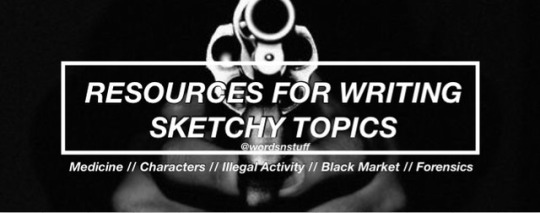
Medicine
A Study In Physical Injury
Comas
Medical Facts And Tips For Your Writing Needs
Broken Bones
Burns
Unconsciousness & Head Trauma
Blood Loss
Stab Wounds
Pain & Shock
All About Mechanical Injuries (Injuries Caused By Violence)
Writing Specific Characters
Portraying a kleptomaniac.
Playing a character with cancer.
How to portray a power driven character.
Playing the manipulative character.
Portraying a character with borderline personality disorder.
Playing a character with Orthorexia Nervosa.
Writing a character who lost someone important.
Playing the bullies.
Portraying the drug dealer.
Playing a rebellious character.
How to portray a sociopath.
How to write characters with PTSD.
Playing characters with memory loss.
Playing a pyromaniac.
How to write a mute character.
How to write a character with an OCD.
How to play a stoner.
Playing a character with an eating disorder.
Portraying a character who is anti-social.
Portraying a character who is depressed.
How to portray someone with dyslexia.
How to portray a character with bipolar disorder.
Portraying a character with severe depression.
How to play a serial killer.
Writing insane characters.
Playing a character under the influence of marijuana.
Tips on writing a drug addict.
How to write a character with HPD.
Writing a character with Nymphomania.
Writing a character with schizophrenia.
Writing a character with Dissociative Identity Disorder.
Writing a character with depression.
Writing a character who suffers from night terrors.
Writing a character with paranoid personality disorder.
How to play a victim of rape.
How to play a mentally ill/insane character.
Writing a character who self-harms.
Writing a character who is high on amphetamines.
How to play the stalker.
How to portray a character high on cocaine.
Playing a character with ADHD.
How to play a sexual assault victim.
Writing a compulsive gambler.
Playing a character who is faking a disorder.
Playing a prisoner.
Portraying an emotionally detached character.
How to play a character with social anxiety.
Portraying a character who is high.
Portraying characters who have secrets.
Portraying a recovering alcoholic.
Portraying a sex addict.
How to play someone creepy.
Portraying sexually/emotionally abused characters.
Playing a character under the influence of drugs.
Playing a character who struggles with Bulimia.
Illegal Activity
Examining Mob Mentality
How Street Gangs Work
Domestic Abuse
Torture
Assault
Murder
Terrorism
Internet Fraud
Cyberwarfare
Computer Viruses
Corporate Crime
Political Corruption
Drug Trafficking
Human Trafficking
Sex Trafficking
Illegal Immigration
Contemporary Slavery
Black Market Prices & Profits
AK-47 prices on the black market
Bribes
Computer Hackers and Online Fraud
Contract Killing
Exotic Animals
Fake Diplomas
Fake ID Cards, Passports and Other Identity Documents
Human Smuggling Fees
Human Traffickers Prices
Kidney and Organ Trafficking Prices
Prostitution Prices
Cocaine Prices
Ecstasy Pills Prices
Heroin Prices
Marijuana Prices
Meth Prices
Earnings From Illegal Jobs
Countries In Order Of Largest To Smallest Risk
Forensics
arson
Asphyxia
Blood Analysis
Book Review
Cause & Manner of Death
Chemistry/Physics
Computers/Cell Phones/Electronics
Cool & Odd-Mostly Odd
Corpse Identification
Corpse Location
Crime and Science Radio
crime lab
Crime Scene
Cults and Religions
DNA
Document Examination
Fingerprints/Patterned Evidence
Firearms Analysis
Forensic Anthropology
Forensic Art
Forensic Dentistry
Forensic History
Forensic Psychiatry
General Forensics
Guest Blogger
High Tech Forensics
Interesting Cases
Interesting Places
Interviews
Medical History
Medical Issues
Misc
Multiple Murderers
On This Day
Poisons & Drugs
Police Procedure
Q&A
serial killers
Space Program
Stupid Criminals
Theft
Time of Death
Toxicology
Trauma
296K notes
·
View notes
Photo
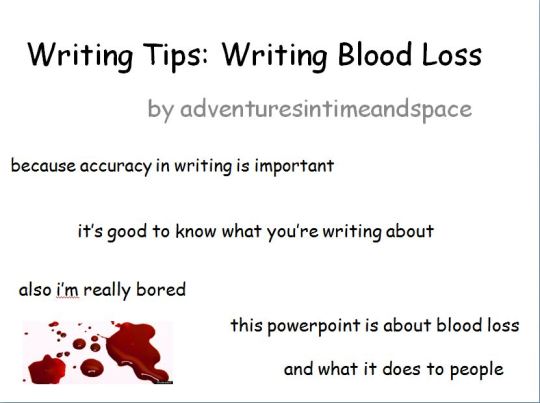
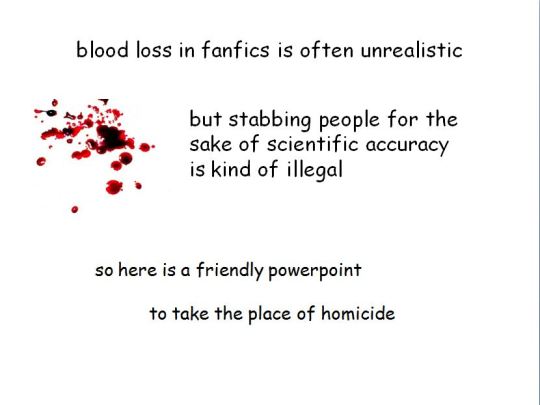


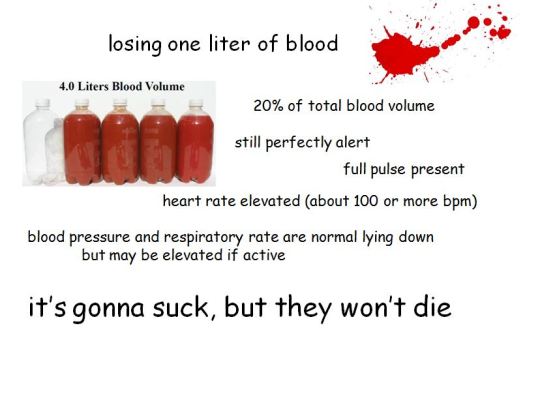
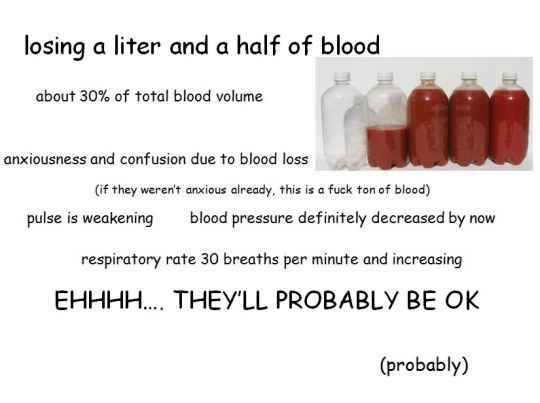
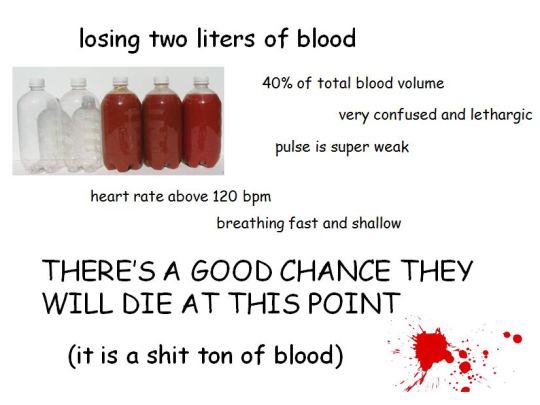
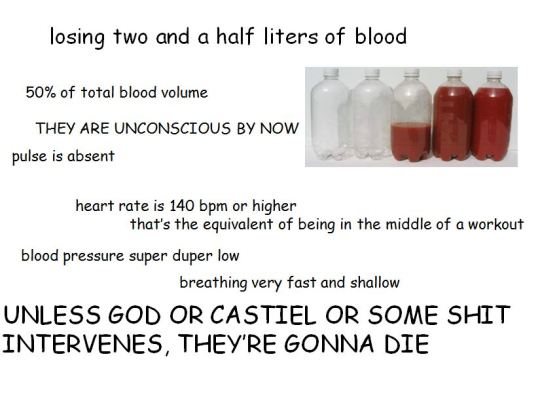
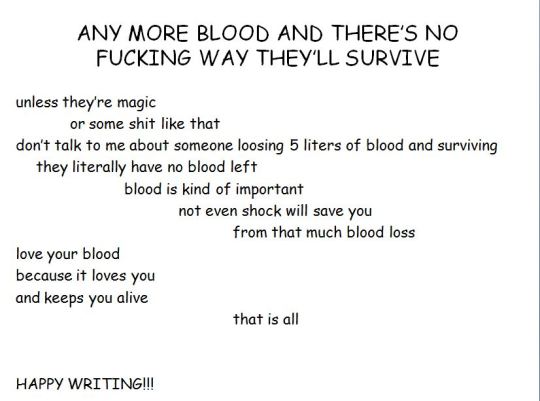
Here are some scientific facts about blood loss for all you psychopaths writers out there.
289K notes
·
View notes


